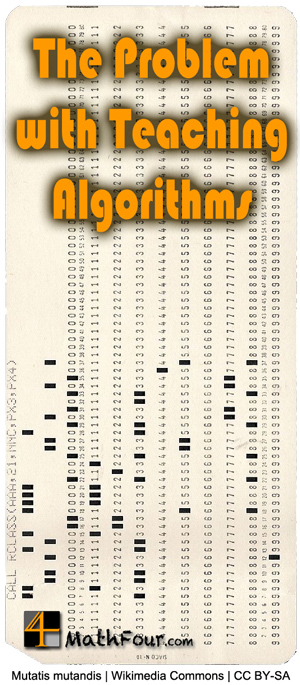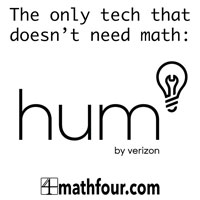 The latest in the Math Wars is the Algorithm Battle.
The latest in the Math Wars is the Algorithm Battle.
It continued yesterday with a post on the New York Times “The Stone” blog called The Faulty Logic of the ‘Math Wars’.
It was quite refreshing to see DeltaScape’s calming post Wanna Race? that refuted it and gave an alternate way to look at things.
Algorithms are programs.
Kinda like computer programs (which are also called algorithms) – algorithms are step by step rules of how to get something done.
Over time, we’ve moved from teaching strategies to do math to teaching algorithms to do math.
And indeed it seems good.
After all, if we can teach a child 20 algorithms in a year, they’ll be better off than if we help them learn 10 strategies in a year.
That’s twice as much content. And twice as much knowledge.
Right?
There are 3 problems with teaching algorithms.
1. Students come to believe that doing math IS doing the algorithm.
An algorithm is one way of doing a problem, that may – or may not – be efficient for someone.
The algorithm is not the math. It’s just a route.
And it holds no promise of understanding or discovery.
2. Students learn to stop thinking and start asking for the algorithm.
I was devastated the first time I heard, “Can you just tell us the steps?”
But that’s what we’ve trained today’s college students to be: Algorithm learners.
Which would be okay, except for this:
3. The human brain is not a computer!
In order for an algorithm to work, it has to be followed exactly.
Computers can do this. Humans cannot.
And when teachers write algorithms, they don’t write down everything. They assume that students know and understand some underlying principals – like the order of operations, what a function is, how to do long division, etc.
But humans as computers are bug-riddled. Their “central processor” isn’t reliable. To assume they remember and can properly run those old programs is – well – it’s just foolish.
They aren’t computers.
To program or not to program – that is the question.
Early on students get conditioned that doing math means doing steps. Which trains them to ask for those steps anytime they encounter something new.
And the steps are okay – in the early days. But as students get more advanced and need more creative and critical thinking, algorithms won’t help.
So join the Algorithm Battle. Let’s work to pull away from feeding punchcards into those little brains that aren’t computers.
And if you haven’t read the articles that inspired this, I encourage you to do so. At least read the short and sweet one from DeltaScape.
This post may contain affiliate links. When you use them, you support us so we can continue to provide free content!






